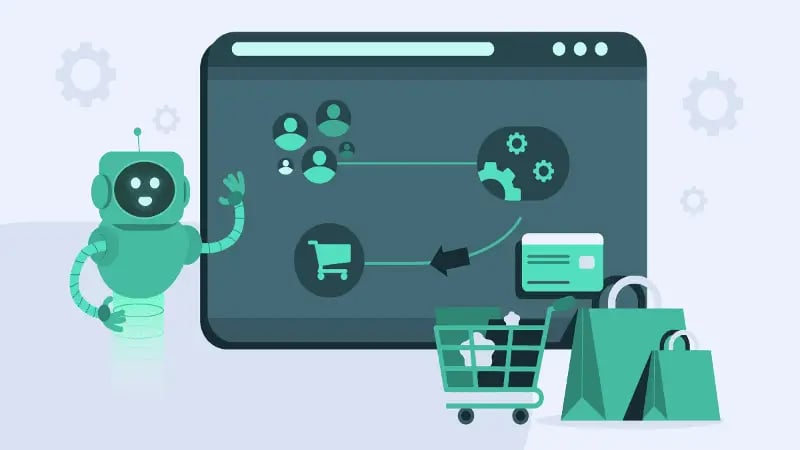How AI Chatbots are Reshaping Marketing?
Marketing has undergone a tremendous transformation in the past decade with the rise of new technologies like artificial intelligence (AI) and chatbots. Chatbots, powered by AI, are one of the biggest disruptors in marketing today. They are reshaping marketing strategies by enhancing customer engagement, improving lead generation and conversion, providing 24/7 customer support, and offering highly personalized experiences.
The advent of AI chatbots has led to a paradigm shift in marketing and customer engagement strategies across industries. According to research by Gartner, over 85% of customer interactions were handled by AI chatbots in the year 2022, compared to just 15% in 2018. This exponential growth underscores the expanding role of conversational AI in providing hyper-personalized and efficient customer experiences.
As per Juniper Research, chatbots will deliver over $142 billion in cost savings by 2023 through automation of customer service. The impact on marketing is already visible with chatbots handling promotional campaigns, content marketing, social media engagement, and market research more efficiently.
By serving as the first line of interaction with customers, AI chatbots are providing brands with a competitive advantage through enhanced experiences. The integration of chatbots in marketing stacks is disrupting traditional models. Conversational AI will soon become integral to the marketing mix enabling hyper-personalization at scale.
What are Chatbots?
A chatbot is a software application that uses artificial intelligence and natural language processing to understand human language and interact with users through text or voice conversations. They are programmed to simulate human-like conversations and assist users by providing information or performing simple tasks like booking appointments, answering FAQs, recommending products, etc.
Benefits of Using Chatbots for Marketing
Here are some of the key ways in which chatbots are reshaping modern marketing:
1. Enhanced Customer Engagement
Chatbots allow brands to engage customers in meaningful conversations at scale across multiple channels like websites, social media, and messaging apps without requiring human intervention. They keep users engaged by responding to queries promptly in a human-like manner using NLP. This leads to higher satisfaction.
2. 24/7 Availability and Instant Response
Chatbots are available 24/7, unlike humans. They can handle hundreds of customer queries simultaneously without delays. Instant responses lead to higher satisfaction and loyalty. Customers need not wait in long queues for agents anymore.
3. Lead Generation and Conversion
Chatbots help businesses generate more quality leads by starting conversations with site visitors and collecting contact information through interactive forms. Their conversations are personalized to qualify leads. They can also nurture leads by sending regular content and notifications until they are sales-ready. Higher engagement rates improve lead conversion.
4. Hyper-Personalization
With access to customer data, chatbots can offer hyper-personalized experiences by understanding individual contexts and needs. From customized product recommendations to personalized communication, they tailor conversations. This creates meaningful engagement with higher satisfaction.
5. Consistent Messaging
Chatbots communicate consistently, unlike humans, who may deviate from brand guidelines. They reinforce brand messaging and tone of voice in all conversations without fail, ensuring consistency across customer touchpoints.
6. Cost and Operational Efficiency
Chatbots reduce operational costs by automating repetitive tasks that don't require human agents. 24/7 availability also cuts down on staffing costs. They scale quickly without added costs as conversational loads increase. Overall, they provide higher ROI than traditional channels.
7. Faster Complaint Resolution
Chatbots resolve customer complaints faster by accurately identifying issues and providing appropriate real-time solutions. Quick complaint resolution improves brand reputation and satisfaction levels. Agents can then focus on more complex issues.
8. Rich Customer Insights
Chatbot conversations generate volumes of customer data from queries, responses, emotions, keywords used, patterns, etc. These rich insights help businesses understand customers better and tailor marketing initiatives accordingly.
Types of Marketing Chatbots
-
Information Chatbots: Provide instant answers to common customer queries like store hours, shipping details, FAQs, etc. Reduce wait times and human efforts.
-
Reservation/Booking Chatbots: Help users book appointments, tickets, tables, etc easily through conversational UI. Simplify booking.
-
Lead Generation Chatbots: Engage site visitors through quizzes, calculators, and questionnaires to collect contact info. Qualify and nurture leads.
-
Customer Service Chatbots: Resolve common customer issues, handle feedback, and address grievances, thereby improving CSAT.
-
Campaign Chatbots: Promote marketing campaigns through contests, coupons, and referral programs. Generate leads.
-
Social Media Chatbots: Engage followers on social media through live chat for sales, support, and interaction.
-
Personal Assistant Chatbots: Act as personal shopping assistants to recommend products and simplify purchasing based on user preferences.
-
Payment Chatbots: Facilitate easy payments for products/services through conversational commerce.
Key Considerations for Marketing Chatbots
While chatbots open up immense possibilities, focus on these aspects for success:
-
Clear objectives: Define goals and use cases to guide strategy and development.
-
Strong AI capabilities: Invest in best-in-class NLP and natural conversation abilities for human-like interactions.
-
Omnichannel availability: Deploy chatbots across key touchpoints- website, apps, social media, etc for wider reach.
-
Mobile-first design: Optimize chatbot UX for smartphones as they are the primary engagement channel today.
-
Contextual conversations: Leverage customer data to make conversations hyper-personalized and contextual.
-
Integration with marketing stack: Integrate chatbots with existing marketing stack like CRM, email marketing, etc to unify data.
-
Hybrid model: Combine chatbots and human agents for best results. Use chatbots for automating tasks and humans for complex issues.
-
Continuous training: Train chatbots continuously with new data to improve their understanding and performance.
-
Marketing the bot: Promote chatbots across channels to drive awareness and adoption.
-
Analytics & Optimization: Track KPIs around conversations, resolutions, satisfaction, leads, etc., to optimize chatbot performance.
Chatbot Use Cases for Different Marketing Functions
Let's look at some specific use cases of AI chatbots for key marketing functions:
-
Lead generation: Lead nurturing chatbots engage visitors and collect lead information through quizzes, calculators, etc. Real estate chatbots capture details of potential buyers and help shortlist options.
-
Social media marketing: Chatbots boost social media engagement by starting meaningful conversations with followers. They run contests, share updates, and drive participation.
-
Customer support: FAQs and customer service chatbots address common queries, resolve issues, and route complex cases to agents. This cuts wait times and improves CSAT.
-
Campaigns & promotions: Chatbots promote marketing campaigns through competitions, sweepstakes, and referral programs. Users engage more with chatbots than static content.
-
Market research: Chatbots conduct market research at scale by asking users various questions through surveys, and quizzes. The data helps design products, services, and campaigns.
-
Customer segmentation: Based on conversational data around user needs, interests, and pain points, chatbots can categorize customers into distinct segments for targeted marketing.
-
Content marketing: Chatbots boost content reach and engagement. They share blogs, guides, and videos with prospects and collect feedback to refine content strategy.
-
Personalization: Chatbots use customer data to offer personalized product suggestions, recommendations, communication, and special discounts or incentives.
-
E-commerce: Shopping assistants guide users through purchases, recommend products, simplify transactions and payments, and upsell items in the shopping cart.
-
Customer engagement: Chatbots engage customers across the buying journey - from awareness to consideration to purchase and support through two-way conversations.
The Possibilities are Endless
Chatbots are truly revolutionizing marketing across sectors and company sizes. Brands are unleashing innovation with chatbots across industries:
-
E-commerce: 24/7 shopping assistants that help customers search for products, get recommendations, and complete purchases.
-
Banking: Virtual financial assistants handle transactions, address account queries, and provide financial tips.
-
Travel: Intelligent travel bots help explore destination options, compare prices, book flights or hotels, and guide the entire journey.
-
Healthcare: Healthcare chatbots diagnose symptoms, provide health advice, help book doctor appointments, and act as virtual nurses.
-
Real Estate: AI bots engage home buyers, shortlist suitable properties using filters, and provide agent contact.
-
Hospitality: Restaurant chatbots help customers explore menus, reserve tables, order food, and make payments.
-
Media: Newsbots deliver personalized news to users based on interests.
-
Automotive: Car company bots share model details, locate dealers, calculate loans, and enable bookings.
-
Retail: Shopping assistants help customers choose products, give gift ideas, notify deals, and enable voice commerce.
Key Challenge Faced for Marketing Chatbots
Here are some of the key challenges faced in the adoption and implementation of AI chatbots for marketing:
-
Consumer trust: Many consumers still do not feel comfortable sharing personal data with chatbots or relying on them for recommendations. Building consumer confidence is crucial.
-
Technical limitations: Chatbots with inadequate NLP and dialog management may fail to understand complex customer queries and conversations. This leads to poor experiences.
-
Integration difficulties: Integrating chatbots with existing marketing and sales tech stacks can be challenging requiring significant technical expertise.
-
Measuring ROI: Marketers may find it difficult to accurately measure the return on investment from chatbot marketing initiatives compared to traditional channels.
-
Development costs: Developing high-quality chatbots with strong NLP and machine learning capabilities requires significant investments.
-
Regulations: The lack of regulations around the use of conversational data raises privacy concerns. Proper data governance is needed.
-
Information security: Potential data breaches of customer information obtained by chatbots pose reputation risks.
-
Omnichannel deployment: Deploying chatbots seamlessly across multiple channels like web, mobile, and social media requires effort.
-
Consumer education: Many customers are still unaware of chatbot functionalities requiring education and training.
-
Human handoff: Inadequate handoff between chatbots and human agents can negatively impact customer experience.
Overcoming these challenges requires strategic vision, substantial investments and a phased rollout focused on driving adoption. But the long-term gains of personalized, immersive customer experiences delivered by marketing chatbots make it worthwhile for forward-thinking brands.
Conclusion
The meteoric rise of chatbots represents a new era of intelligent conversations that deliver unparalleled customer experiences. Their ability to engage users in a humanized, contextual, and real-time manner is driving higher satisfaction and loyalty.
As AI capabilities continue to evolve, chatbots are poised to become an indispensable part of the marketing technology stack, seamlessly integrating into omnichannel strategies. Brands need to proactively embrace conversational interfaces to stay ahead of the curve. In many ways, chatbots are already redefining marketing by making experiences effortless, interactive, and hyper-personalized.
Though chatbot adoption is still in the early stages, it represents the future of customer engagement across industries. As marketing continues to shift from a campaign-focused to a conversation-focused approach, AI-powered chatbots will be at the epicenter of shaping experiences and enabling brands to build relationships that resonate with modern consumers.
This content is also available in:
- Deutsch: Wie KI-Chatbots das Marketing umgestalten?
- Español: ¿Cómo están cambiando el marketing los chatbots de IA?
- Français: Comment les chatbots IA remodèlent le marketing ?
- Italiano: Come i chatbot AI stanno ridisegnando il marketing?
- Română: Cum transformă AI Chatbots marketingul?
- 简体中文: 人工智能聊天机器人如何重塑营销?

Opinions expressed in this article are those of the guest author. Aspiration Marketing neither confirms nor disputes any of the conclusions presented.









Leave a Comment